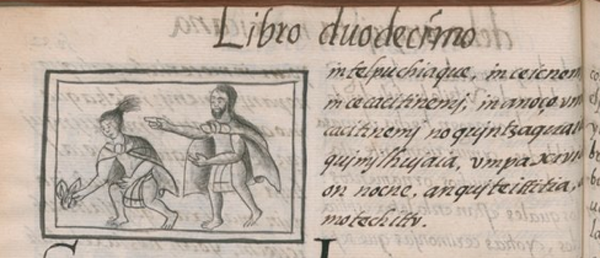Folio 32 verso
Translations and Transcriptions
Spanish Translation
[Translation of the Nahuatl into Spanish by Fr. Bernardino de Sahagún; transcription of the Spanish (left-hand column) by James Lockhart:] [f. 32v., un dibujo; sin texto en español]
English Translation
[Translation of the Nahuatl (right-hand column) by James Lockhart:]
youth
Analytic Transcription
[Transcription of the Nahuatl (right-hand column) by James Lockhart:] [f. 32v.] in telpuchiaque,* in ce ic nemi, in ce cacitinemi, in anoço vme cacitinemi no quintzaquaia: quimilhuiaia, vmpa xiviā on nocne, anquiteittitia, amotech itto. ---------- *IN YIAQUE: . . . IN TELPUCHIAQUE. Here I have followed Sahagún 1950–1982: 13.54; I have been unable to identify the form "yiaque" or "iaque." Conceivably it could be the plural of yaqui, a preterit agentive from yauh 'to go', with the meaning "one who has gone," but no such usage has come to my attention. The y added to the first example makes one think of the word iyac 'something or someone with a stench'.
Image

Spanish Translation
[Translation of the Nahuatl into Spanish by Fr. Bernardino de Sahagún; transcription of the Spanish (left-hand column) by James Lockhart:] [f. 32v., un dibujo; sin texto en español]
English Translation
[Translation of the Nahuatl (right-hand column) by James Lockhart:]
youth
Analytic Transcription
[Transcription of the Nahuatl (right-hand column) by James Lockhart:] [f. 32v.] in telpuchiaque,* in ce ic nemi, in ce cacitinemi, in anoço vme cacitinemi no quintzaquaia: quimilhuiaia, vmpa xiviā on nocne, anquiteittitia, amotech itto. ---------- *IN YIAQUE: . . . IN TELPUCHIAQUE. Here I have followed Sahagún 1950–1982: 13.54; I have been unable to identify the form "yiaque" or "iaque." Conceivably it could be the plural of yaqui, a preterit agentive from yauh 'to go', with the meaning "one who has gone," but no such usage has come to my attention. The y added to the first example makes one think of the word iyac 'something or someone with a stench'.
Image
